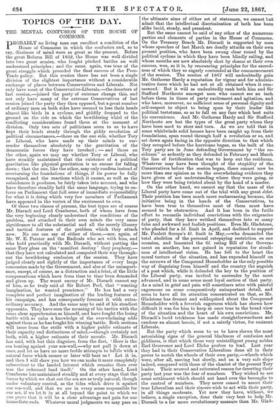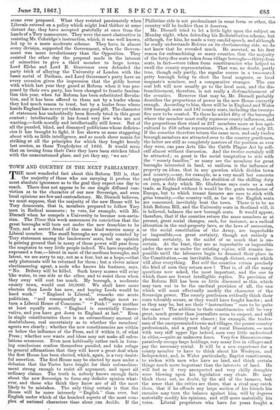TOPICS OF THE DAY.
THE MENTAL CONFUSION OF THE HOUSE OF COMMONS.
PROBABLY no living man can recollect a condition of the House of Commons in which the confusion and, so to say, dizziness of mind were so great as the present. Before the great Reform Bill of 1832, the House was well divided into two great armies, who fought pitched battles on well understood principles ; and the same, again, was true of the great struggle which preceded the final success of the Free- Trade policy. But this session there has not been a single division of the slightest importance without a considerable exchange of places between Conservatives and Liberals. Not only have most of the Conservative-Liberals,—the deserters of last session,—joined the party of extreme change this, and not only have many of the extreme Conservatives of last session joined the party they then opposed, but a great number of ordinary men on both sides have seemed to lose their heads almost like birds in a cyclone, and giddily dropped to the ground on the side on which the bewildering whirl of the conflicting considerations found them at the moment of division. Only two sets of politicians seem to us to have kept their heads steady through the giddy revolution of political circumstances,—those on the one side, whether Tory or Liberal, who have made up their minds to sur- render themselves absolutely to the gravitation of the democratic forces they have invoked ; — and those on the other, again we may say whether Tory or Liberal, who have steadily maintained that the existence of a political gravitation like physical gravitation is no excuse for falling down ; that the one, like the other, may only confirm instead of overturning the foundations of things, if its power be fully recognized, and the reactions which it causes, as well as the subsidences it produces, be fairly taken into account, and who have therefore steadily held the same language, trying to en- force on Parliament that full sense of immediate responsibility for what it is doing which very few members of Parliament have appeared in the vortex of the excitement to own.
Of these two classes of persons, the best types are of course Mr. Disraeli and Lord Cranborne, both of whom have from the very beginning clearly understood the conditions of the problem, and attached in their own minds the very same significance to all the substantial and all the merely illusory and tactical features of the problem which they attach now. No one can say of either of these,—nor, again, of Mr. W. E. Forster and the Radicals who act with him, and who hold practically with Mr. Disraeli, without putting the same Tory gloss on the manifest destiny ' they prophesy,— that they have not calculated and computed their way through- out the bewildering confusion of the session. They have judged clearly and rightly of the importance of every large concession made by the Government, and also of the unimport- ance, except, of course, as a distraction and a feint, of the little compensations which have from time to time been demanded and given up. The worst enemy of Mr. Disraeli cannot say of him, as he truly said of Sir Robert Peel, that " wanting imagination, he wanted prescience." He has had a very complete and perfect imagination of the leading features of his campaign, and has consequently forecast it with extra- ordinary accuracy. And the same may be said of his steadiest opponents. They have seen the meaning of his tactics with the same clear apprehension as himself, and have fought the losing battle with as calm a knowledge of the overwhelming odds against them as he has fought his winning battle. Both sections will issue from the strife with a higher public estimate of their capacity and distinctness of mind,—though certainly not both, with a higher estimate of their morale. Mr. Disraeli has said, with but thin disguises, from the first, 'Here is the sea beating against your sea-wall,—why not pull it down at once, and let us have no more feeble attempts to battle with a natural force which sooner or later will beat us ? Let it in, and then I will show you how we can make it more completely subservient to the landed interest which remains than ever was the redeemed land itself.' On the other hand, Lord Cranborne has maintained steadily and at every stage that the forces by which we shut out the sea are as truly natural, though under voluntary control, as the tides which drive it against our sea-wall, and that we are in every sense responsible for our act, if we let it in at all beyond the point to which we can prove that it will be a clear advantage and gain for our immediate ends. Whatever moral judgments we may pass on
the ultimate aims of either set of statesmen, we cannot but admit that the intellectual discrimination of both has been: alike lucid, steady, and prescient.
But the same cannot be said of any other of the numerous• parties and elements of parties in the House of Commons_ Onthe Treasury Bench Mr. Disraeli is supported by men whose speeches of last March are deadly attacks on their own present position, who have been swung clear round. by the political cyclone in which they have been blindly sailing, and whose mouths are now absolutely shut by shame at their own. success, won, as it is, by renouncing principles for the sacred- ness of which they so eagerly contended at the commencement of the session. The session of 1867 will undoubtedly gain Mr. Gathorne Hardy a reputation for vigour and for adminis- trative force which he had not at all obtained when it com- menced: But it will as undoubtedly rank both him and Sir Stafford Northcote amongst men who cannot see an inch before them in times of party excitement and agitation, and. who have, moreover, no sufficient sense of personal dignity and_ self-respect to object to being spun by their leader like political teetotums, so as to fall on any face which best suits. his convenience. And Mr. Gathorne Hardy and Sir Stafford. Northcote are but the types of the great party whom they have been used to steer and turn. As we are told that in some whirlwinds solid houses have been caught up from their foundations, spun round through half a revolution or so, and, set down again facing in the opposite direction to that which they occupied before the hurricane began, so the bulk of the. Tory party are in June defending Government by " the re- siduum" as ardently as they defended in February and March the line of fortification that was to keep out the residuum. Whatever may have, been thought of the stupidity of tha Conservatives before the session began, there cannot now ba more than one opinion as to the overwhelming evidence they have given of not understanding where they were going, or how they were being twisted about by the hand of a master.
On the other hand, we cannot say that the mass of the. Liberal party have come out of the trial with any great éclat. Their position has been much more embarrassing because, the initiative being in the hands of the Conservatives, to have been true to themselves most of them must have seemed to be obstructive. And it has been in the futile effort to reconcile individual convictions with the exigencies of party, that they have writhed themselves into so many- false and awkward and foolish positions. Even Mr. Gladstone, who pleaded for a 5/. limit in April, and declined to support Mr. Poulett Scrope's 41. limit in May,—who demanded the total abolition of the personal ratepaying restriction on one- occasion, and lamented the 6/. rating Bill of the Govern- ment on another, has not gained in reputation for steadi- ness of intellectual vision. He has felt to the heart the moral torture of the situation, and has expended himself on the sorrows of the Compound Householder as the only possible way of disguising from himself and the country the anguish of a post which, while it defended the key to the position of the Liberal party, was invited to surrender by the most advanced, and in some sense most loyal section of that party- As a mind in grief and pain will sometimes seize with painful eagernesss on some comparatively unimportant detail, and seem to have all its attention concentrated on that, so Mr. Gladstone has dreamt and soliloquized about the Compound Householder with a feverish eagerness which has shown how difficult it was for him to keep at once true to the broad view of the situation and the heart of his own convictions. Mr. Disraeli's lucid trickiness has made straightforwardness and candour an almost heroic, if not a saintly virtue, for eminent Liberals.
But the party which seem to us to have shown the most astonishing signs of the general blackness of confusion and giddiness, is that which those very unintelligent young nobles Earl Grosvenor and Lord Elcho profess to lead. Last year they had in their Conservative Liberalism done all in their power to scotch the wheels of their own party,wheels which were, after all, moving but slowly, and on a very safe slope indeed, compared with those of the chariot of the present Tory leader. Their avowed and reiterated reason for deserting their party last year was the fear of numbers. They wished to see some settlement which should not hand over the boroughs to- the control of numbers. They never ceased to assert their- true Liberalism and their sincere wish to act with their party, in all things moderate. Yet now they have, without, we believe, a single exception, done their very best to help Mr.. Disraeli to a far more revolutionary measure than Mr. Glad-
stone ever proposed. What they resisted passionately when liberals entered on a policy which might lead thither at some distant day, they have accepted gratefully at once from the lands of a Tory manceuvrer. They were the most obstructive in resisting Mr. Coleridge's instruction, which, it was well known, led up to a more moderate scheme. They have, in almost every division, supported the Government, when the Govern- ment was more revolutionary than the Opposition. They resisted the other day the proposal made in the interest of minorities to give a third member to large towns. lord Elcho and Lord R. Grosvenor even defended the party trick of alloying the University of London with the laser metal of Durham, and Lord Grosvenor's party have on every occasion given the impression that the giddy horror with which last year they gazed at Reform when it was pro- posed by their own party, has been changed to frantic fascina- tion this year, when for Reform has been substituted Revolu- tion, and it has been offered to them not by a leader whom they had much reason to trust, but by a leader from whose lands England has never yet taken any good gift. The character of statesmen has undoubtedly been fiercely tried in this great contest ; intellectually it has found very few who are not wanting,—both morally and intellectually still fewer. But of 1111 the puzzled, blind, and dismayed politicians whose deficien- cies it has brought to light, it has shown us none staggering about with so little intelligence, and so much sheer mania for striking at all the principles for which they fought keenly last session, as those Troglodytes of 1866. It would seem that on issuing from their Cave they have been stricken blind with the unaccustomed glare, and yet they say, L we see.'































 Previous page
Previous page